Article source: Vita Dog Nutritionist
China Clinical Nutrition Network has been authorized to reprint
Author: Peng Yigu (Master of Food Science, research direction: food nutrition and hygiene)
Please put on two more clothes before reading this article, because knowledge is a little cold. To tell the truth, I have already prepared my mind, and the reading volume may not be very high, but you don’t know, this is the basic knowledge of nutrition. After learning, you will know that keeping in good health is such a simple thing.
Just as building a house requires laying a foundation, dogs, as a popular science worker, must teach you these basic knowledge so that you can learn better and more steadily.
Therefore, please read this article patiently, and you will gain a different life. Starting today’s program, how can dietary fiber be used? Why does your impression of it only stop at losing weight? Is all this a distortion of human nature or a moral decay? Welcome to "Approaching Science": Dietary Fiber-the Guardian of Human Health.
Next you will see:
1. What exactly is dietary fiber?
2. How strong is dietary fiber?
3. Food sources of dietary fiber
4. Three misunderstandings of dietary fiber

Nutrition experts are always reminding: to eat more dietary fiber, what is it? The professional definition is: polysaccharide that exists in plants and cannot be digested and absorbed by human body. Speak human words …
First of all, as long as the food grows in the ground, it contains dietary fiber, not just vegetables, fruits and whole grains you think. Like mushrooms and nuts, they are also rich in dietary fiber (which we will talk about later).
Secondly, dietary fiber is a kind of carbohydrate, which can be divided into simple and complex schools. Dietary fiber is a disciple of polysaccharide under complex schools, and this disciple is very different.
▼
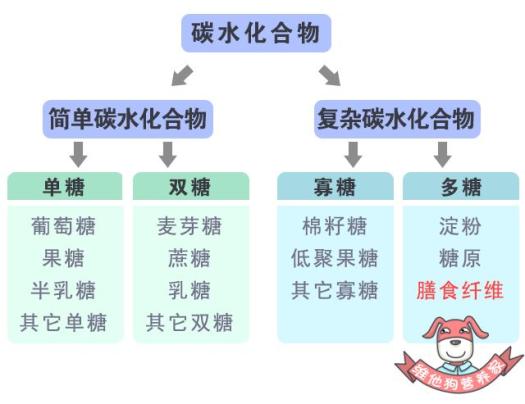
Why is it different? Because it can neither be digested nor absorbed by the human body, nor can it provide energy for the human body. See? Why do people think of losing weight when it comes to dietary fiber? I think the root cause lies here. So, dietary fiber seems to be useless, a waste? No, outstanding people are often different. Dietary fiber has made great contributions to our human body. Read on.

Before clarifying this question, let’s learn about the classification of dietary fiber.
1. The classification of dietary fiber
▼
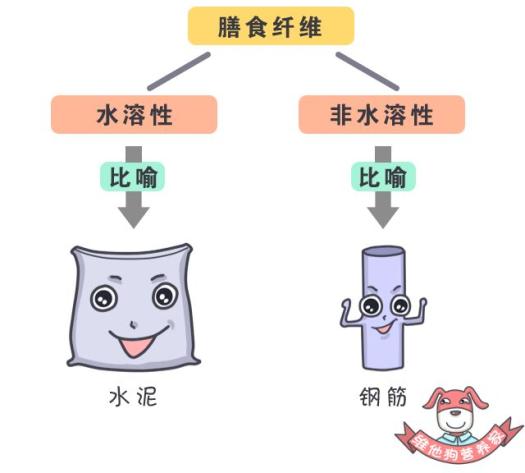
Water solubility, as the name implies, means that this kind of fiber can be dissolved in water, just like cement, which will swell up after absorbing water and make the food ball sticky. For a simple example, when people soak oatmeal, have you noticed that it becomes sticky after a long time? This is due to the water-soluble fiber in oats.
Although water-insoluble dietary fibers are insoluble in water, they are mixed in the food ball, just like steel bars, which is beneficial to prop up the food ball and make it bigger, thus increasing satiety and stimulating intestinal peristalsis. They are inseparable friends, and most plant foods contain both dietary fibers.
2. The role of dietary fiber
It is precisely because dietary fiber can get rich when it meets water, oh no, it gets fat when it meets water, and it is firmly bonded with other substances, so the health effect is increasing.
First of all, of course, it is well-known to lose weight.
Controlling weight is beneficial to losing weight.
Reason: The combination of dietary fiber and food can increase the volume and consistency in the stomach and increase the feeling of fullness, thus making you eat less. Plus it can’t provide energy, which helps you reduce your energy intake.
Reduce serum cholesterol and prevent heart disease.
Reason: Here we want to talk about a substance called bile acid, which is a component of digestive juice and secreted by the liver, and can promote our body’s absorption of fat and cholesterol.
▼
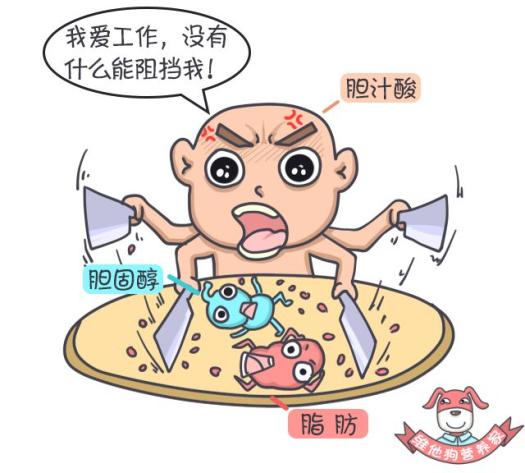
However, dietary fiber can adsorb bile acids.
▼

With less bile acid, the absorption rate of fat and cholesterol will decrease, which is beneficial to the decline of blood lipid, which also reduces the risk of coronary heart disease.
Conducive to controlling blood sugar and maintaining balance.
Reason: First of all, dietary fiber will not increase blood sugar because it will not be digested and absorbed by the intestine and will not provide energy. In addition, dietary fiber mixed with chyme can also reduce the absorption of sugar in food by small intestine, thus slowly raising blood sugar.
▼
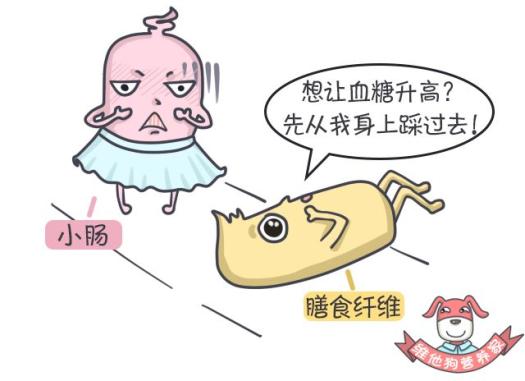
Because dietary fiber comes forward, the pancreas does not need to secrete so much insulin to metabolize sugar, which also reduces the working pressure of the pancreas, thus reducing the occurrence of diabetes.
▼
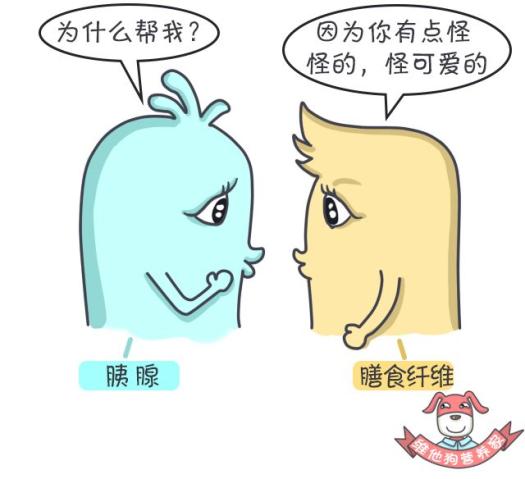
Conducive to the growth of intestinal probiotics
Reason: Water-soluble dietary fiber can be fermented by intestinal bacteria to synthesize short-chain fatty acids, which is a hotbed for probiotics. Short-chain fatty acids can also adjust the PH value of the intestine, which is more conducive to the growth of probiotics. When probiotics are strong, harmful bacteria in the intestines can’t make waves, and the intestines are healthier.
▼
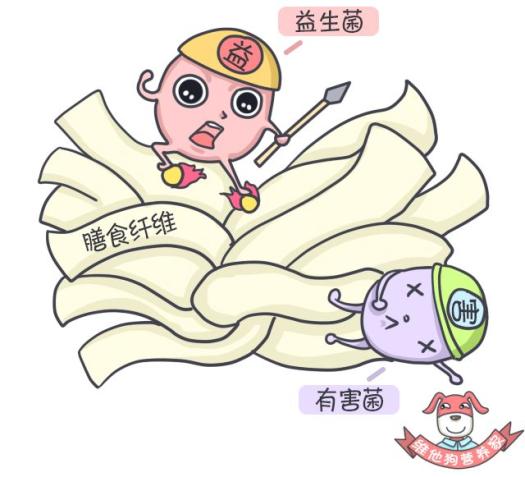
Enhance intestinal function, which is beneficial to waste discharge.
Reason: As we said just now, dietary fiber expands when it meets water, and when it is combined with stool, it can make it bigger and softer, which is beneficial to the discharge of stool, and cellulose can also promote intestinal peristalsis, which accelerates defecation.
In addition, dietary fiber will be discharged with a small amount of cholesterol, fat and heavy metals in food, and you will feel light and relaxed.
▼

Prevention of colon cancer
Reason: The time of defecation is accelerated, which also means that it stays in the intestine for a shorter time, which can prevent carcinogens from contacting with the easily infected intestinal mucosa for a long time, thus reducing the possibility of canceration.
▼
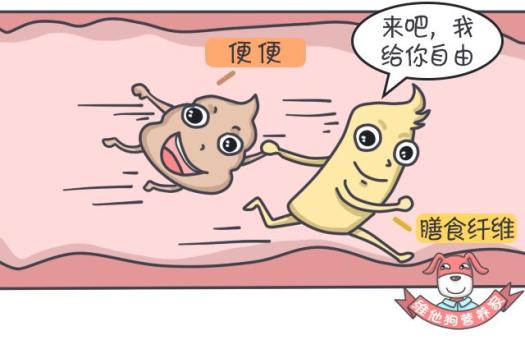
The above six points are the efficacy of dietary fiber. See, it is simply a warm man who cares about everything and has a central air conditioning level!
In this era of obesity, diabetes and heart disease, dietary fiber is the hero to save mankind!
▼

Hurry up and pass it on to those people around you who don’t like fruits and vegetables, and let them see what a pity it is!

Since dietary fiber is so great, which foods have high dietary fiber content? Please accept this form.
▼
(Click to enlarge)
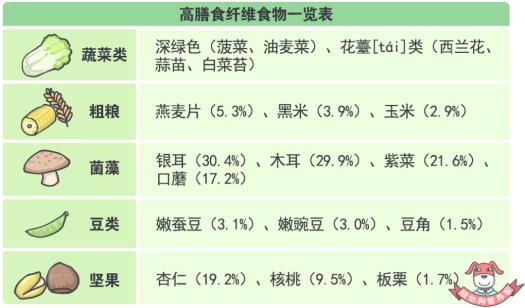
Here, dogs want to focus on the category of vegetables. Generally speaking, the dietary fiber content of wild vegetables is higher than that of cultivated vegetables, and dark green vegetables are higher than that of light-colored vegetables.
So, are all vegetables high in dietary fiber?
No, usually fruit vegetables, such as tomatoes (0.5%), cucumbers (0.5%) and wax gourd (0.7%) are relatively low. So, you should know which vegetable to choose for constipation!
After seeing the last row of nuts, friends who want to lose weight and want to eat nuts can choose almonds.
Dietary fiber has so many benefits, so is it better to eat more?
No, too much intake is not good for human body, because dietary fiber can be combined with iron, calcium, zinc, etc., thus affecting the absorption and utilization of these elements, which will lead to malnutrition in the long run.
The standard is to consume 30g every day. Take tremella with high content in mushroom as an example. Eating about 100g is equivalent to 30g of dietary fiber. However, dogs don’t advise you to eat a single food to meet your needs, but to diversify your food. Unfortunately, according to statistics, the dietary fiber intake of Chinese residents is far from the standard.
Come on! You, with your plain appearance and average qualifications, finally have a chance to get ahead!
I hope that in the future dinner, everyone will stop vomiting-inducing toasts, but
▼
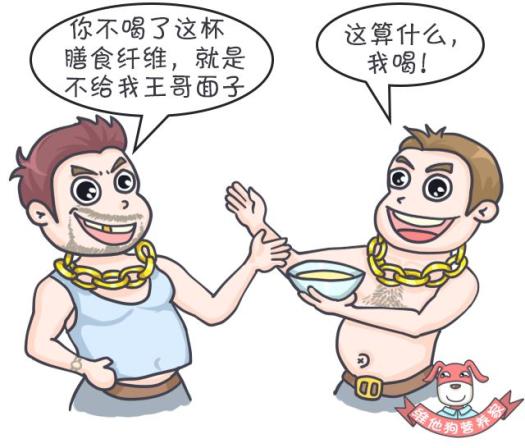
In order to help people make better use of it, the dog lists the questions that people often ask me and answers them uniformly.

1. Is the dietary fiber content of vegetables with tendons higher than that of vegetables without tendons?
NO! This truth is like a real rich man. You may not see that TA is wearing any famous brand from head to toe, but you really just can’t see it. For example, sweet potato does not contain gluten, but its cellulose content is much higher than that of Chinese cabbage with gluten. In addition, as we mentioned just now, there is no gluten in fungus, tremella and laver, but the dietary fiber content is very high.
2. Does chopping and breaking vegetables lose the healthy function of fiber?
Not really. Fiber can not be digested by human small intestine, so it can play a healthy role and will not be changed by physical treatment. Whether it is chopped or boiled, it will not change.
Yes, it is not afraid of chopping!
Studies have measured the swelling power and water-holding capacity of dietary fiber from burdock residue, and the swelling power and water-holding capacity of dietary fiber are basically unchanged when it is crushed in the range of 355um-250um. However, under normal circumstances, we don’t need to break it too much, because other oxidizable nutrients will be lost, and secondly, we will eat more food.
3. Does the more dietary fiber you eat, the more you lose weight?
Dietary fiber absorbs water and expands in the stomach, resulting in satiety, reducing eating other foods and really helping to lose weight. However, if you eat dietary fiber without reducing the intake of other foods, it will not help you lose weight.
At present, there are many biscuits with high dietary fiber on the market, saying that they can lose weight. The dog wants to explain that you may get fatter and fatter as you eat them. Because dietary fiber can’t be digested, especially insoluble dietary fiber, the taste is not good. In order to avoid stinging, a lot of oil will be added to improve the taste. You may eat more fat than dietary fiber, so don’t be superstitious.
That’s all for today’s cold knowledge. I believe you will work hard to reach the standard and win at a healthy starting line. After all, something good will happen to those who live long enough.
Summary: the role of dietary fiber
1. Weight control is beneficial to lose weight.
2. Reduce serum cholesterol and prevent heart disease.
3. It is beneficial to control blood sugar and maintain balance.
4. Conducive to the growth of intestinal probiotics
5. Enhance intestinal function, which is beneficial to waste discharge.
Step 6 Prevent colon cancer
References:
[1] Sun Changyao, editor-in-chief. Nutrition and Food Hygiene. Eighth edition, People’s Health Publishing House, 2017.
[2] Yang Yuexin, Zhang Lishi, Mi Mantian. Public nutritionist. Beijing: China Labor and Social Security Press, 2012.
Yang Yuexin, Wang Guangya, Pan Xingchang. China Food Composition Table. Beijing: Peking University Medical Press, 2002.
[4] Fan Zhihong, N rumors about dietary fiber, 2009.
Xu Jing, Zhang Tao, Jiang Bo, et al. Study on the structure and physical properties of dietary fiber particles from burdock residue [J]. Food Industry Science and Technology, 2010,7:026.
Editorial Department of China Clinical Nutrition Network
Dynamic column of this site:
Original title: "[Popular Science Nutrition] Is eating dietary fiber just to lose weight? You underestimate its power! 》
Read the original text